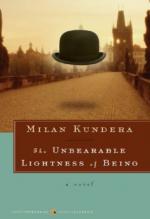|
This section contains 3,522 words (approx. 12 pages at 300 words per page) |

|
SOURCE: “Kundera and Jane Austen,” in Review of Contemporary Fiction, Vol. 9, No. 2, Summer, 1989, pp. 58-64.
In the following essay, Bayley draws comparisons between Jane Austen's novelistic departures in Northanger Abbey and Kundera's response to “kitsch” and his narrative innovations in The Unbearable Lightness of Being.
In The Art of the Novel Kundera speaks of his “disgust” with those who reduce a work of fiction to its ideas. Yes, but who watches the watchers, who preserves the critic from this primal fault, when the critic is also a novelist? It might seem that there is no answer to this question. Kundera is a writer very different from his admired Kafka, who has no “ideas,” who made a world of his own, a private world in which privacy had no existence; and who thus anticipated—as Kundera says—the society of totalitarianism and the concentration camp. Kafka knew nothing of...
|
This section contains 3,522 words (approx. 12 pages at 300 words per page) |

|


